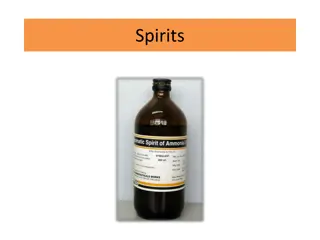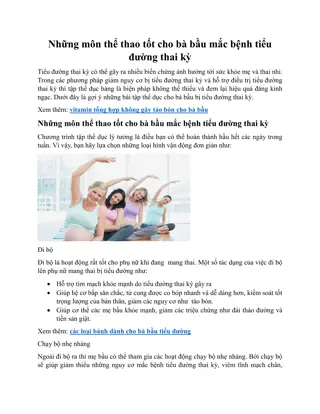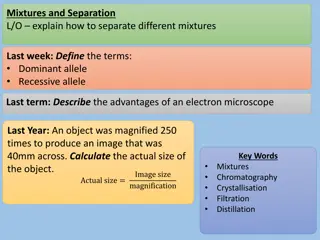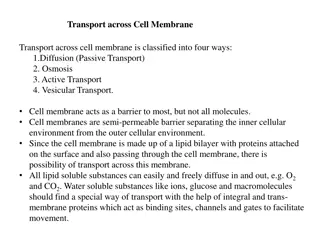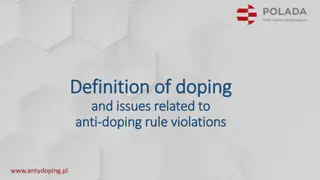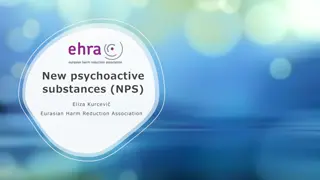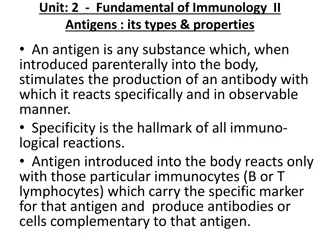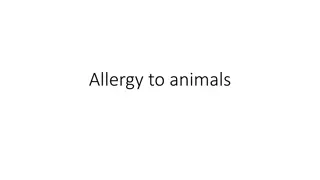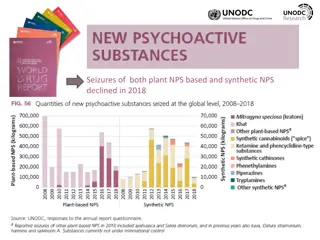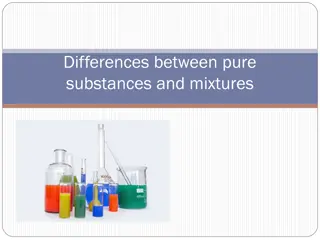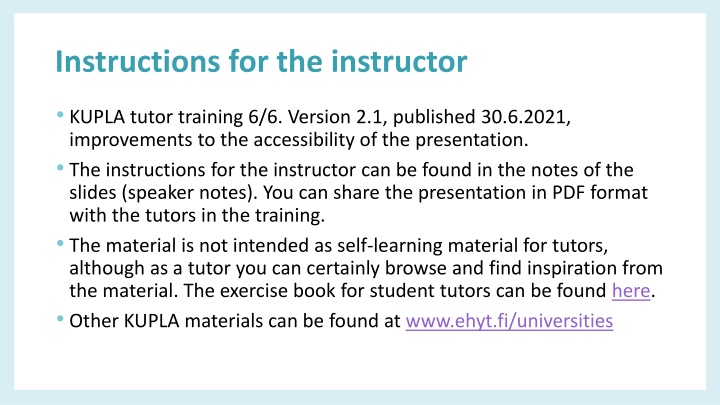
Role of Substances in Study Communities and Tutor Responsibility
Explore the crucial role of substances in study communities and the significance of addressing substance-related issues in tutoring. Gain insights into identifying concerns, guiding fresher students, and understanding university rules on substance abuse prevention.
Download Presentation

Please find below an Image/Link to download the presentation.
The content on the website is provided AS IS for your information and personal use only. It may not be sold, licensed, or shared on other websites without obtaining consent from the author. If you encounter any issues during the download, it is possible that the publisher has removed the file from their server.
You are allowed to download the files provided on this website for personal or commercial use, subject to the condition that they are used lawfully. All files are the property of their respective owners.
The content on the website is provided AS IS for your information and personal use only. It may not be sold, licensed, or shared on other websites without obtaining consent from the author.
E N D
Presentation Transcript
Instructions for the instructor KUPLA tutor training 6/6. Version 2.1, published 30.6.2021, improvements to the accessibility of the presentation. The instructions for the instructor can be found in the notes of the slides (speaker notes). You can share the presentation in PDF format with the tutors in the training. The material is not intended as self-learning material for tutors, although as a tutor you can certainly browse and find inspiration from the material. The exercise book for student tutors can be found here. Other KUPLA materials can be found at www.ehyt.fi/universities
TUTOR TRAINING The role of substances in study community
Training objectives Consider what role substances play in your own study community. Understand why it is essential in tutoring activities to discuss substances. Learn ways to take substances-related matters into account when tutoring. Know how to raise your concern related to observed substance abuse and to guide the fresher to get help.
Training topics The role of substances in study community Raising the concern and where to get help
The role of substances in study community
Exercise F Think about the aspects that have affected your own attitude towards substances.
Which aspects should you note as a tutor? 17% of new students do not participate in student events at all. The third most common reason not to participate in events is the feeling that the events are too alcohol-oriented. As a tutor, you influence the perception of new students about the new study community: What you say and how you act symbolise the general attitudes towards substance use. If you are concerned about a new students' substance use or well-being, it is good to know how to raise your concern and where to guide the new student if needed. University/UAS usually have rules (Student substance abuse prevention programme) for substances and harms of substance use it is useful for a tutor to know where you can find these rules.
Exercise Line exercise F Place yourself on the line according to your opinion. You can agree with the statement/question, disagree or place yourself somewhere in between these two. There are no right or wrong answers.
Exercise F I participate in student events with pleasure not at all
F Getting heavily drunk is part of the student culture not part of the student culture Exercise
Exercise F I have been worried of a fellow student's substance use - I have not been worried
Exercise Discuss with your pair Does studying while intoxicated or with a hangover affect the ability to study? Is it OK to tutor while intoxicated or with a hangover? Why and why not? What are the negative effects of substance use during studies in a fresher group?
Exercise Talk about the situation with another fresher Is it OK to study while intoxicated or with a hangover? Why and why not? What are the positive effects sought with the use of substances? What are the negative effects of substance use during studies in a fresher group? F
Substances are used to boost or silence our feelings Reinforcing positive feelings It s fun to be drunk Strong feeling of togetherness, rewarding time together Controlling negative feelings Stress, tension related to social situations, melancholy, anxiety, loneliness, feeling of being outsider, boredom Link between substance abuse and mental well-being Source: Antti Maunu
How can students prevent harms caused by substance use in their communities? Explore and promote your own ability to study Search for help from peer tutors, teachers, other guidance services of the university and student health care (FSHS). Avoid using substances so that it will cause harm to you or others. Participate in the activities of the university community. Maintain a culture in which social support is given and received and nobody is left outside the community. Discuss concerns related to you or a fellow student. Put no pressure on others on substance use.
What can you do as a tutor? Plan ahead what you are doing and why. What is the objective of your activities? Treat the new student as an equal; do not abuse your position. Arrange events/meetings taking into account the wishes of all the participants (not just the majority). Support and encourage to participate. Do not force, hurt, or pressure Communicate in channels that are open and accessible to all participants. Discuss together the rules of the new student group as well as the role of substances in studying and group meetings. Raise your concerns related to a fellow student and encourage others to do the same.
Consider in advance Can students participate without alcohol or other substances and without having to explain it? Is there pressure to use alcohol or other substances while being part of the group or events? Is the main way to get to know each other by getting drunk? Be concerned about substance use that impairs the ability to study, not if someone is not using substances. Let's make everyone have such a great meeting and a feeling of being welcome, that they want to participate in the group in the future. Group ground rules
Student substance abuse prevention programme University/UAS-specific, defines for example: substances and attitudes towards them during studies prevention of harms caused by substance use, student guidance and responsibilities drug tests, right to study and suitability to work in the field seeking help and studying after treatment. Defines also the responsibilities Your own university s program should be available for you in your university s intranet.
Exercise Plan and brainstorm 1/4 Group/pair names: Fill the paper as seen in the image 1. 2. 3. 4.
Exercise Plan and brainstorm 2/4 Group/pair names: 1 minute per idea 1. Activity experiment not a sport but 2. Let's get acquainted with the association/hobby/issue X 3. The best events in the city for under 10 euros 4. Let s eat together a dinner with a twist
Exercise Plan and brainstorm 3/4 Group/pair names: Give your paper to the group next to you Improve the other group s ideas: You can use, for example, the following sentences/ideas: Yes, and in addition... Half of this and half of that Let s do this in cooperation with... How my field of study would do this 1. Activity experiment not a sport but 2. Let's get acquainted with the association/hobby/issue X 3. The best events in the city for under 10 euros Do not comment with a good idea but give concrete comments, like remember breaks and fireworks at the end . Take a photo of the paper and give it back to the other group. 4. Let s eat together a dinner with a twist
Exercise Plan and brainstorm 4/4 checklist Do the ideas fulfil at least some of the following conditions? Edit your ideas so that these conditions are met: [ ] People get to know each other [ ] You would participate yourself [ ] Everyone feels welcome as they are [ ] Alcohol does not further participation/drinking alcohol is not assumed [ ] Touching other people is not assumed [ ] There is a clear idea of what the activity includes and what its goal is why exactly this is being done.
Exercise Before the first evening get-together F Ask the freshers: 1. What do you expect from this evening? 2. What would you expect from the other members of the group from this evening? 3. Do you have concerns about this evening? 4. How can we make it a nice evening together for everyone?
Raising the concern and where to get help
Exercise Case Aati and case Paju Let s divide into groups of three Half of the groups will discuss case 1 and another half case 2, when you are ready, move on to the other case. Write down your answers Duration 5 min
Exercise continues 1. New student Aati says that they are really stressed about the beginning of the studies and cannot sleep well. They feel like they are not good enough to study on their own field. What kind of specifying questions would you ask? How do you support/guide Aati? ______________________________________________________________ Exercise 2. New student Paju has spent most of their first study year in student parties and group meetings. Paju is nice and social person but cannot control their alcohol consumption and always passes out during the night. Paju has become a burden for the rest of the new student group, since others are worried about Paju already at the beginning of the evening. Paju is not fit to get in bars, and taxis won t accept them as a passenger. Paju is not violent and is ashamed of their behaviour the next day. How to raise this issue with Paju?
Help your fellow student, raise the concern Tutors and students play a key role in recognising issues related to the mental well-being and substance use of their fellow students. Raise your concerns openly, for example, by asking How are you doing? and I m worried about you... . Talk about your concerns and observations. Concentrate on listening to others and ask more questions, if necessary (ensure that you have really understood the issue) "What do you wish from me right now?" Remember that you don t have to solve the problem. Discuss together how you could get help for the problem problems should always be solved in cooperation. All you need to do is to ask and listen. Source: KUPLA, Talking about substances at universities guide booklet
More info and where to seek help 1/2 University s/UAS s guidance services (e.g. Study psychologists, University chaplains) Student health care / The Finnish Student Health Service (FSHS) The Finnish Association for Mental Health provides crisis assistance and support www.mielenterveysseura.fi/en/support-and- help/support-and-help-foreigners Nyyti promotes and supports students mental health, life management and study skills, www.nyyti.fi/en Information about living and working in Finland Welcome to Finland and www.infofinland.fi
More info and where to seek help 2/2 AddictionLink website is intended for substance abusers, their families and friends and all those interested in objective information on substances and addiction. Within AddictionLink you can read up on the latest topics within the addiction scene and test your situation with self assessment tests and self-help tools. www.addictionlink.fi Substance abuse counseling helpline: help and support for those who are concerned about their own or someone s substance abuse. Ask if service in english is possible p. 0800 90045, 24/7 free of charge Peluuri provides support and information for gamblers and their families and friends, www.peluuri.fi/en Low-threshold interventions for excessive gamers Digipelirajat on
Summary In order to promote the well-being of others, you must first take care of your own study ability and your mental well-being. It is good to consider fostering your own well-being in advance. Everyone has moments that strain their mental well-being during their studies. Discuss your situation with a person close to you and/or professional. Talk to a fresher or classmate about your concerns. The tutor is not anyone s therapist. As a tutor, the most important thing is active listening, casual encounters, and guiding forward.
KUPLA Students reforming substance use culture The training has been developed by KUPLA Students reforming substance use culture , a joint project by EHYT ry and Nyyti ry. The project was ongoing from 2018 to 2020. National partners in the programme included the National Union of University Students in Finland (SYL), University of Applied Sciences Students in Finland (SAMOK), Finnish Student Sports Federation (OLL) and the Finnish Student Health Service (FSHS). This work is licensed under a Creative Commons Attribution 4.0 International License. Read more about the license on Creative Commons website. This training may be used, shared and modified freely with a reference to KUPLA as the original author. Other materials for the KUPLA project can be found on EHYT's website, www.ehyt.fi



